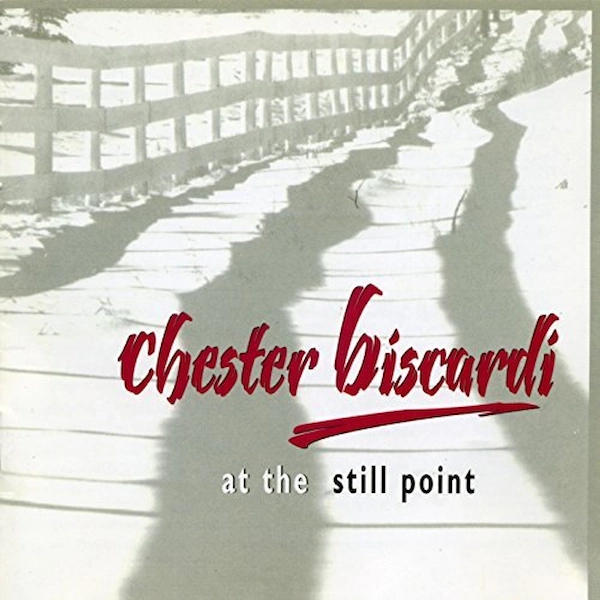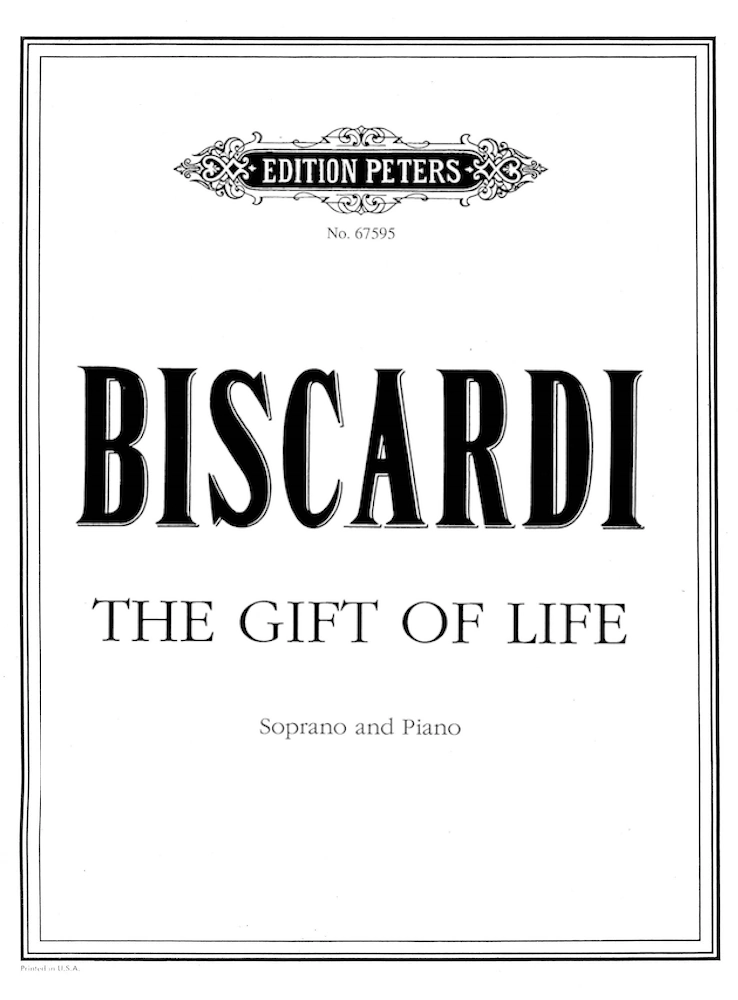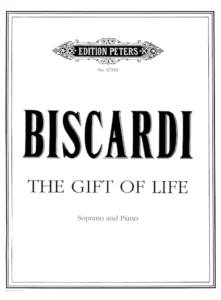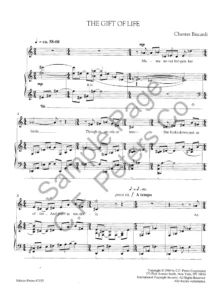“The Gift of Life (1990-93) is a brief song cycle on texts of Dickinson, Levertov, and Wilder; it is notable not only for the music, but also for the extremely careful matching of disparate texts to form a moving whole – images of birds and mothers, ideas of aging and death, flow in a sequence that creates its own logic (Biscardi’s graduate study in Italian literature before his move to composition obviously helped here). Furthermore, the vocal writing is genuinely beautiful. The setting of Emily Dickinson’s ‘Mama never forgets her birds . . .,’ which opens the piece, is nearly perfect in its matching of harmonic rhythm to poetic rhyme and meter. Biscardi uses a music that is evocative of Barber without sounding like a knockoff . . . the piece is genuinely affecting, and its expressive sincerity is matched by its musical substance.”
—Robert Carl, Fanfare, The Magazine for Serious Record Collectors (1995)
“The Gift of Life, for soprano and piano (1990-93), is the crowning jewel of this release. An all too brief song cycle on texts by Emily Dickinson, Denise Levertov, and Thornton Wilder, it has the directness and accessibility of Aaron Copland’s music from the mid 30s through the 40s. Make no mistake, however; the voice is Biscardi’s – a voice that fully informs each piece on this release regardless of its technical or stylistic properties…”
—William Zagorski, Fanfare, The Magazine for Serious Record Collectors (1995)
“Composed for soprano Judith Bettina, who premiered the work with her pianist husband James Goldsworthy, The Gift of Life (1990-1993) is a song cycle on texts of Emily Dickinson, Denise Levertov, and Thornton Wilder that speak of birth, life, memory, loss, death, and, finally, love.
In these songs I chose texts according to their power to generate musical images concerning memory, time, and the cyclical nature of existence, themes that are recurrent in much of my vocal as well as instrumental music.
A cycle in the true sense of the term, there is a continuous flow from one text to another, with few discernible divisions or traditional cadences. It is a kind of dramatic scene, if not a mini-opera, and the idiomatic vocal writing is very lyric and extraordinarily beautiful.
The piece opens with a characteristic motive that appears in various guises (enharmonic, retrograde, rhythmically altered, etc.) and transpositions throughout the cycle. In fact, the three pitches – E#, G#, and F# – are pivotal to the work, both linearly and harmonically, in voice and piano. These are powerful texts, although with a gentle philosophy, and the melodic lines are consistently and expressively evocative of the emotions of the texts.
The setting of Emily Dickinson’s ‘Mama never forgets her birds…,’ which opens the piece, is nearly perfect in its matching of harmonic rhythm to poetic rhyme and meter.
—Robert Carl, Fanfare, 1995)
The rather static – but by no means uninteresting – rhythmic structure reflects the meditative quality of the work. In view of the Schubert analogy established earlier, another apt comparison occurs in Biscardi’s use of recitative-like, parlando passages, sometimes unaccompanied, for particularly dramatic effect. At the end of this moving cycle, the text affirms that “the bridge is love,” connecting the living to the dead, lifting the numbness of loss, and allowing us to be free; at this intensely expressive moment, the chief motive, introduced in the opening lullaby, reappears, tying the whole work together. That the motive remains incomplete in the voice part at the end may suggest that the individual is left to fulfill the ‘meaning.'”
—Richard Dale Sjoerdsma, Journal of Singing (2008)
“The Gift of Life…is a song cycle completed fifteen years ago. The composer explains in the liner notes that he wrote this in the wake of a most satisfying collaboration with Henry Butler for a chamber opera titled Tight-Rope. The pleasure of working with characters and plot forever altered the way Biscardi would approach the task of crafting art songs and powerfully shaped the creation of the song cycle. (Biscardi related in some correspondence that after writing his opera, he found it very difficult to return to the arena of instrumental music, although he eventually did so and has gone on to craft powerful and original instrumental works.)
The song cycle was composed for Bettina and Goldsworthy, who perform it here [At the Still Point CRI CD 686] as they did for the work’s premiere in 1993. It begins with an exquisite setting of one of Emily Dickinson’s most tender poems, which opens this way:
Mama never forgets her birds,
Though in another tree —
She looks down just as often
And just as tenderly.
Dickinson wrote this in memory of an aunt who had died and likened her departure from this world to a bird flying from one tree to another, yet still looking down on her baby birds with concern and affection. Biscardi’s sensitive treatment of this text is breath-takingly beautiful, and it draws us inexorably into the rest of this work and exploration of, in Biscardi’s words, “birth, life, memory, loss, death, and finally, love.” The middle portion of the work is based on a text from Denise Levertov’s Life in the Forest, a woman’s thoughtful reflection on her own mother who seems about to slip away from her. This text is less poetic, at least in the conventional sense of the word, which makes it all the more challenging to set to music, but Biscardi responds beautifully with music that gently breathes life into the text without obscuring it. The third and final portion of the text is from Thornton Wilder’s The Bridge of San Luis Rey and speaks powerfully and persuasively of the finality of death and of our own eventual oblivion, but also of the importance of love as the last and, in fact, only bridge between life and death. Here, as throughout the piece, Biscardi writes with a striking mix of sparseness and warmth, and the text is treated with such loving care. Judith Bettina sings beautifully and Jim Goldsworthy offers sensitive accompaniment at every turn.
So yet again, we are left tantalized by the songs of Chester Biscardi and hungry to hear more. May our wait be brief.
—Gregory Berg, The Listener’s Gallery, Journal of Singing (September/October 2008)
“Composed in 1990-1993 for soprano Judith Bettina, this continuous song cycle combining three poems of three different poets into a seamless whole in thought and meaning is reflective and gentle in its treatment of the themes of birth, life, memory, loss, death, and love.
The vocal line is predominantly lyrical in a syllabic setting. There are many skips and leaps, some measured recitative, some phrases that cover the staff, several phrases that lie low in the range, many accidentals, and specific expressive markings. The piano part is melodic and mostly linear with some chordal sections, mildly dissonant tone clusters, many accidentals, and some rather wide reaches in places. An attractive and accessible cycle for both performers and audience, this would be an excellent work for a graduate level soprano with an even scale.”
—Judith Carman, Music Reviews, Journal of Singing (November/December 2000)
“Mr. Biscardi’s 1993 song triptych The Gift of Life had striking texts by Emily Dickinson, Denise Levertov and Thornton Wilder – about appreciating life and its passing.”
—Scott Cantrell, The Dallas Morning News (2003)
“And the song cycle the Gift of Life – which was set to works by Emily Dickinson, Denise Levertov and Thornton Wilder – represented Biscardi’s reined-in romanticism.”
—Wayne Lee Gay, Fort Worth Star-Telegram (2003)








